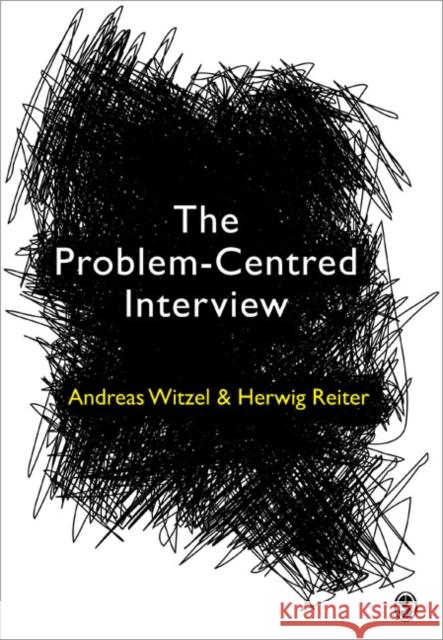The Problem-Centred Interview » książka



The Problem-Centred Interview
ISBN-13: 9781849201001 / Angielski / Miękka / 2012 / 216 str.
The Problem-Centred Interview
ISBN-13: 9781849201001 / Angielski / Miękka / 2012 / 216 str.
(netto: 255,50 VAT: 5%)
Najniższa cena z 30 dni: 236,70
ok. 22 dni roboczych.
Darmowa dostawa!
In the first book in English to cover this important area, readers are introduced to the methodology, principles and practice of Problem-Centred Interviewing.
From underlying principles through procedures and techniques to analysis, conceptualisation, and the interface with other methods, this is the definitive foundational text for the PCI. Supported by exemplars and case studies, generously illustrated by informative learning aids, and with tips on pitfalls and troubleshooting, Witzel and Reiter provide readers with every resource to discover the power of this compelling method.
Nigel Fielding
University of Surrey
A method widely used in the German social sciences, this book is the first to bring the problem-centred interview (PCI) to the Anglo speaking world. This excellent and lucidly written book is a must for qualitative researchers and all those who see interviewing as a craft.
Julia Brannen
Thomas Coram Research Unit, Institute of Education
Within this technique the idea of producing knowledge as a joint effort of researchers and interview partners is systematically conceptualised. This is an excellent and highly accessible introduction to key aspects of interviewing and a practical guide for beginners and advanced researchers.
Gunter Mey
University of Applied Sciences Magdeburg-Stendal, Germany
Throughout this text, Witzel and Reiter articulate a rage of interesting and insightful issues, theoretical and practical, pertaining to PCI, backed up by their evident knowledge and expertise of both the literature and practice in the field of qualitative interviewing... Based on the evidence they provide from the outset and throughout the text, PCI may be considered a rich and intellectually challenging alternative to traditional forms of interviewing [which is] more appropriate for seasoned researchers, who have more experience and resources at their disposal, from which to fully engage with and benefit from this method.
Emma Smith
Methodspace
The book is reader-friendly, informative and compactly structured, and it provides comprehensive insight into principles and possible applications of PCIs. Beginners as well as experienced qualitative researchers will find useful ideas and suggestions for an advanced use of the PCI.
Dr. Emanuela Chiapparini
University of Zurich, Socialnet.de
The authors, recognising that the Problem-centred Interview, (PCI) will be largely unfamiliar to English speaking readers, carefully introduce it by comparing and contrasting it with more established methods of qualitative research using interview. In doing this they cover both the theoretical underpinning and the practicalities of using these techniques, followed by an in-depth criticism of their limitations... I think that the PCI provides a rich and sophisticated resource for the experienced researcher and I look forward to seeing publications in English using it.
Clive Sims
Methodspace Book Reviews Group
The book is an excellent further development and a systematic and well-structured description and discussion of 'problem-centred interviews.
Prof. Marianne Schmidt-Grunert
Hamburg University of Applied Sciences, Socialnet.de
Introduction
The Programme of the PCI
Preparing PCIs
Doing PCIs
Processing PCIs
Examples of Working with PCIs
A Final Note on PCI Errors and PitfallS
Dr. Andreas Witzel is a senior researcher in social sciences and lecturer for interpretative methodology since 1976 at the University of Bremen, now retired. His major research interests include qualitative methodology and methods, occupational socialization, biography and the life course. In his position as director of the Bremen Archive for Life Course Research, he pioneered the institutionalization of a central data archive for digital transcripts of qualitative interviews in Germany and the development of approaches to secondary analysis of qualitative data. He did extensive research on occupational status passages of young people and published widely on related issues. His methodological and methodical publications focus on qualitative interviews, methods of analysis, qualitative longitudinal research, and the combination of quantitative and qualitative data.
Herwig Reiter, PhD, is a senior researcher in the Department of Social Monitoring and Methodology of the German Youth Institute in Munich. Before, he was a lecturer in sociology and qualitative methods at the University of Bremen and at the Bremen Graduate School of Social Sciences (BIGSSS). He studied sociology in Vienna and holds a PhD in Political and Social Sciences from the European University Institute. His main areas of research include qualitative methods and methodology as well as youth and life course sociology. He is an editorial board member of the International Journal of Social Research Methodology. His articles appeared in journals like the Journal of International Relations and Development, the Journal of Baltic Studies, Forum: Qualitative Social Research, Zeitschrift für Soziologie, Journal of Adolescence, Journal of Youth Studies, and Educational Research.
1997-2026 DolnySlask.com Agencja Internetowa
KrainaKsiazek.PL - Księgarnia Internetowa









